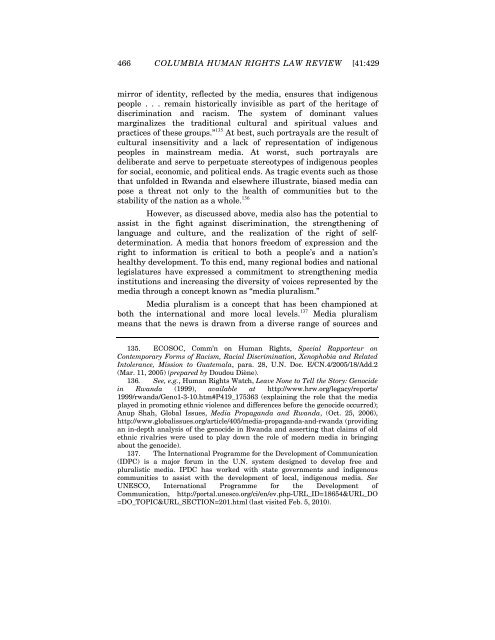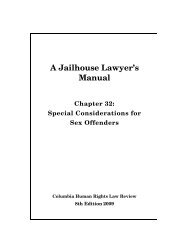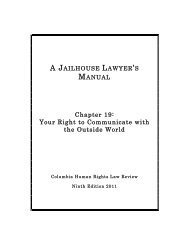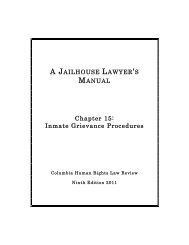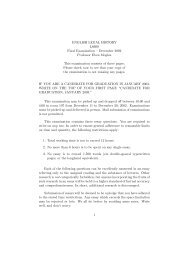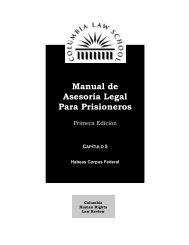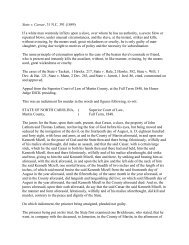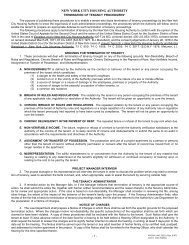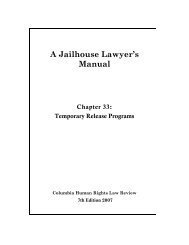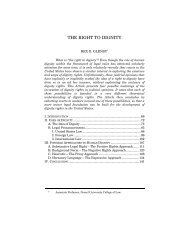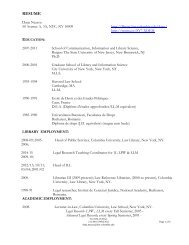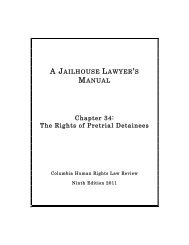A Right to Media? Lorie M. Graham - Columbia Law School
A Right to Media? Lorie M. Graham - Columbia Law School
A Right to Media? Lorie M. Graham - Columbia Law School
You also want an ePaper? Increase the reach of your titles
YUMPU automatically turns print PDFs into web optimized ePapers that Google loves.
466 COLUMBIA HUMAN RIGHTS LAW REVIEW [41:429<br />
mirror of identity, reflected by the media, ensures that indigenous<br />
people . . . remain his<strong>to</strong>rically invisible as part of the heritage of<br />
discrimination and racism. The system of dominant values<br />
marginalizes the traditional cultural and spiritual values and<br />
practices of these groups.” 135 At best, such portrayals are the result of<br />
cultural insensitivity and a lack of representation of indigenous<br />
peoples in mainstream media. At worst, such portrayals are<br />
deliberate and serve <strong>to</strong> perpetuate stereotypes of indigenous peoples<br />
for social, economic, and political ends. As tragic events such as those<br />
that unfolded in Rwanda and elsewhere illustrate, biased media can<br />
pose a threat not only <strong>to</strong> the health of communities but <strong>to</strong> the<br />
stability of the nation as a whole. 136<br />
However, as discussed above, media also has the potential <strong>to</strong><br />
assist in the fight against discrimination, the strengthening of<br />
language and culture, and the realization of the right of selfdetermination.<br />
A media that honors freedom of expression and the<br />
right <strong>to</strong> information is critical <strong>to</strong> both a people’s and a nation’s<br />
healthy development. To this end, many regional bodies and national<br />
legislatures have expressed a commitment <strong>to</strong> strengthening media<br />
institutions and increasing the diversity of voices represented by the<br />
media through a concept known as “media pluralism.”<br />
<strong>Media</strong> pluralism is a concept that has been championed at<br />
both the international and more local levels. 137 <strong>Media</strong> pluralism<br />
means that the news is drawn from a diverse range of sources and<br />
135. ECOSOC, Comm’n on Human <strong>Right</strong>s, Special Rapporteur on<br />
Contemporary Forms of Racism, Racial Discrimination, Xenophobia and Related<br />
In<strong>to</strong>lerance, Mission <strong>to</strong> Guatemala, para. 28, U.N. Doc. E/CN.4/2005/18/Add.2<br />
(Mar. 11, 2005) (prepared by Doudou Diène).<br />
136. See, e.g., Human <strong>Right</strong>s Watch, Leave None <strong>to</strong> Tell the S<strong>to</strong>ry: Genocide<br />
in Rwanda (1999), available at http://www.hrw.org/legacy/reports/<br />
1999/rwanda/Geno1-3-10.htm#P419_175363 (explaining the role that the media<br />
played in promoting ethnic violence and differences before the genocide occurred);<br />
Anup Shah, Global Issues, <strong>Media</strong> Propaganda and Rwanda, (Oct. 25, 2006),<br />
http://www.globalissues.org/article/405/media-propaganda-and-rwanda (providing<br />
an in-depth analysis of the genocide in Rwanda and asserting that claims of old<br />
ethnic rivalries were used <strong>to</strong> play down the role of modern media in bringing<br />
about the genocide).<br />
137. The International Programme for the Development of Communication<br />
(IDPC) is a major forum in the U.N. system designed <strong>to</strong> develop free and<br />
pluralistic media. IPDC has worked with state governments and indigenous<br />
communities <strong>to</strong> assist with the development of local, indigenous media. See<br />
UNESCO, International Programme for the Development of<br />
Communication, http://portal.unesco.org/ci/en/ev.php-URL_ID=18654&URL_DO<br />
=DO_TOPIC&URL_SECTION=201.html (last visited Feb. 5, 2010).


